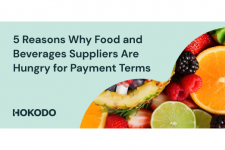EU ‘obliged’ to produce food after climate change

Food production in northern Europe will benefit from climate change and the European Commission (EC), working with farmers and the food industry, has a duty to exploit that advantage, said Lars Hoelgaard, the former deputy director general of the EC’s Directorate-General for Agriculture and Rural Development.
“Given Europe has the world’s best conditions for agricultural production with opitimal climatic conditions with abundant rainfall, moderate temperatures and ideal soil conditions, Europe has not only the potential but also the obligation to participate in feeding the world,” Hoelgaard told FoodManufacture.co.uk.
‘Obligation to participate’
Now working with the Brussels think tank Farm Europe, Hoelgaard said climate change was likely to bring increased precipitation and temperatures in northern Europe with longer growing seasons. But in the south of the continent, climate change was likely to result in more drought and higher temperatures, which would drive down yields, partly through helping the spread of pests and diseases.
The case for boosting European food production in an increasingly hungry world was clear, said Hoelgaard. World population was estimated at about 9bn by the Food and Agriculture Organisation, with an estimated 800M people worldwide thought to be suffering from chronic hunger, he said.
While economic growth in emerging economies was driving diets to include more animal and dairy protein, the trend in Europe was the reverse. EU meat consumption trends were falling, with individuals eating just over 80kg a year compared with more than 90kg in the past, said Hoelgaard.
‘Europe’s food obligation’:
“Europe has not only the potential but also the obligation to participate in feeding the world.”
- Lars Hoelgaard
Within those trends, red meat consumption was falling while consumption of poultry and dairy products were rising.
‘The circular economy’
Whatever the precise pattern of consumption, Hoelgaard said meeting the challenge of producing more food from fewer resources depended on delivering action from catchwords such as “sustainable intensification”, “producing more with less” and “the circular economy”.
All these ideas pointed in the same direction: “We can produce more without this being detrimental to the environment by way of more efficient use of resources, techniques, inputs, water, best practices including the animal health industry as part of the solution,” he said.
EU policy-makers should provide more financial support to achieve a modern and efficient agriculture, with “assistance for research and development, constant innovation and investment in climate friendly production methods”.
European agriculture faced many challenges but had the potential to turn them into strengths in a fast changing competitive environment.
Hoelgaard was speaking before the animal health conference – ‘Healthy animals, healthy food, a healthy future’ – organised by the International Federation for Animal Health – Europe
Meanwhile, find out why the former Brussels top official thought exiting the EU would raise UK food and drink manufacturers’ long-term costs, despite “scare-mongering” press reports and why German GMO fears would derail US/EU trade talks potentially worth billions.
How to boost food production
- Sustainable intensification
- Producing more with less
- The circular economy. “A circular economy seeks to rebuild capital, whether this is financial, manufactured, human, social or natural.
Source: Lars Hoelgaard, think tank Farm Europe




















